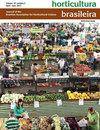Productive and physiological performance of jambu genotypes cultivated in hydroponics
IF 0.8
4区 农林科学
Q4 HORTICULTURE
引用次数: 0
Abstract
ABSTRACT Jambu is a condiment herb used in the preparation of typical and herbal dishes in the Amazon Region. The inflorescences, leaves, and stems of the plant are used. In addition, jambu has numerous applications in the cosmetics and food industries due to the presence of the bioactive compound spilanthol. The objective of this study was to evaluate the productive and physiological performance of jambu genotypes of Acmella oleracea, and Acmella ciliata species grown in hydroponics. The experiment used was a completely randomized design with eight treatments and four replicates. The treatments consisted of jambu genotypes (UFR-1, UFR-2, UFR-3, UFR-4, UFR-5, UFR-6, UFR-7 and UFR-8) collected in different locations in the state of Pará. We evaluated the beginning of flowering, length of the main branch, diameter of the main branch, leaf area, shoot fresh mass, inflorescence fresh mass, root fresh mass, total fresh mass, net photosynthetic rate, stomatal conductance, internal CO2 concentration, and instant carboxylation efficiency. The genotypes presented different behaviors about the productive and physiological growth characteristics. The genotypes UFR-1, UFR-2, UFR-3, UFR-4 and UFR-7 exhibited greater precocity of flowering. In general, genotypes of the species A. oleracea presented lower rate of net photosynthesis when compared to those of the species A. ciliata. The genotypes of A. oleracea showed total fresh mass accumulation capacity, in addition to a high potential for inflorescence production. The genotypes UFR-2 and UFR-4 stood out because they presented higher yields of shoots fresh mass and inflorescences, respectively. Therefore, these genotypes should be considered in crop improvement programs.水培jambu基因型的生产和生理性能
摘要Jambu是一种调味品草本植物,用于制作亚马逊地区的典型菜肴和草药菜肴。使用该植物的花序、叶和茎。此外,由于存在生物活性化合物spilanthol,jambu在化妆品和食品行业有许多应用。本研究的目的是评估在水培中生长的马齿苋和纤毛虫jambu基因型的生产和生理性能。使用的实验是一个完全随机的设计,有八个处理和四个重复。处理由在帕拉州不同地点收集的jambu基因型(UFR-1、UFR-2、UFR-3、UFR-4、UFR-5、UFR-6、UFR-7和UFR-8)组成。我们评估了开花开始、主枝长度、主枝直径、叶面积、茎新鲜质量、花序新鲜质量、根新鲜质量、总新鲜质量、净光合速率、气孔导度、内部CO2浓度和瞬时羧化效率。基因型在生产和生理生长特性方面表现出不同的行为。基因型UFR-1、UFR-2、UFR-3、UFR-4和UFR-7表现出较大的开花早熟性。一般来说,与纤毛虫相比,马齿苋的基因型表现出较低的净光合作用速率。马齿苋的基因型除了具有较高的花序生产潜力外,还表现出总的新鲜质量积累能力。基因型UFR-2和UFR-4脱颖而出,因为它们分别表现出更高的芽鲜质量和花序产量。因此,在作物改良计划中应考虑这些基因型。
本文章由计算机程序翻译,如有差异,请以英文原文为准。
求助全文
约1分钟内获得全文
求助全文
来源期刊

Horticultura Brasileira
农林科学-园艺
CiteScore
1.40
自引率
28.60%
发文量
45
审稿时长
4-8 weeks
期刊介绍:
The journal Horticultura Brasileira, a quarterly journal, is the Official Publication of the Sociedade de Olericultura do Brasil.
Its abbreviated title is Hortic. bras., and it should be used in bibliographies, footnotes, references and bibliographic strips.
 求助内容:
求助内容: 应助结果提醒方式:
应助结果提醒方式:


